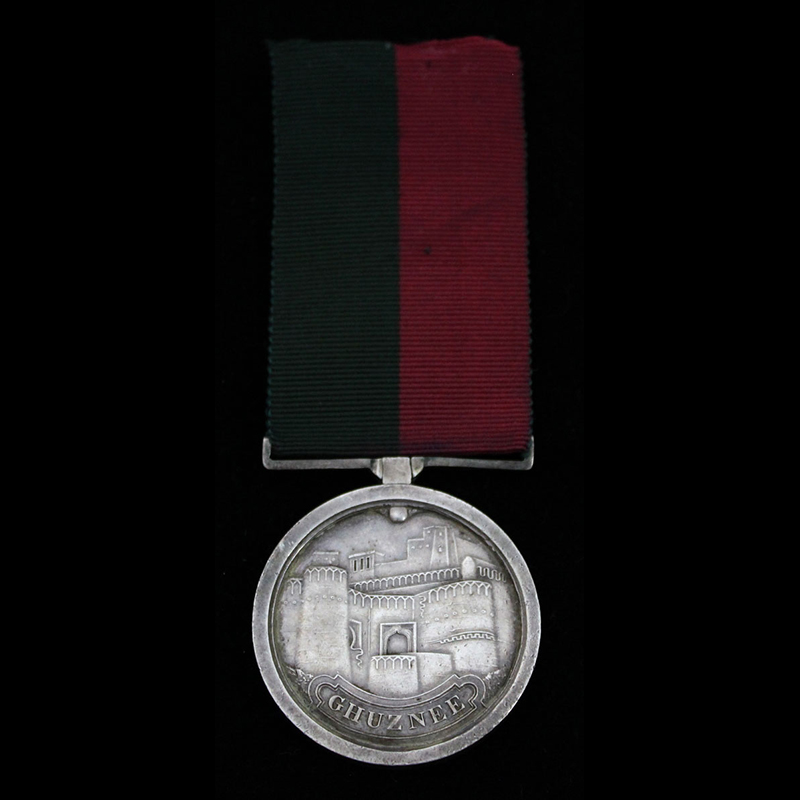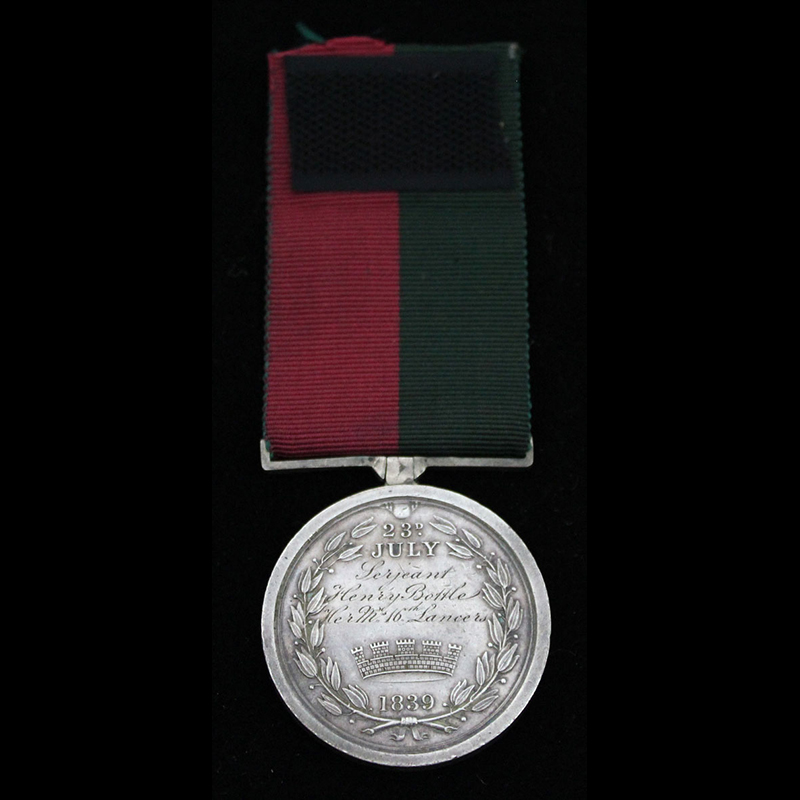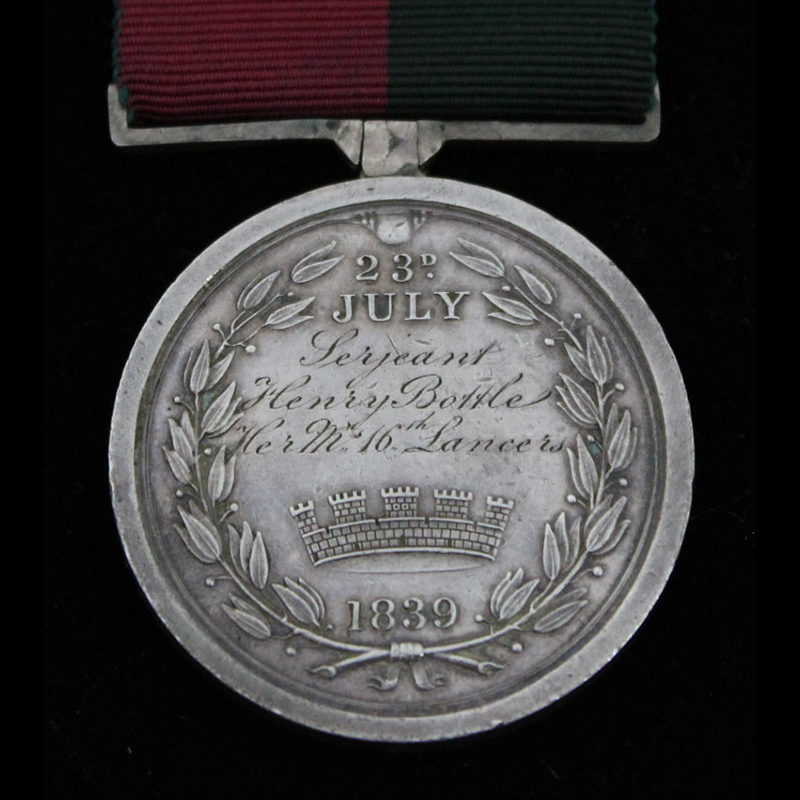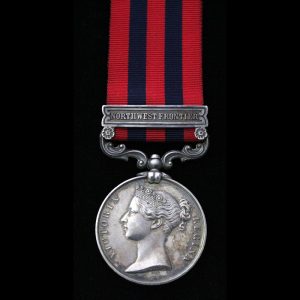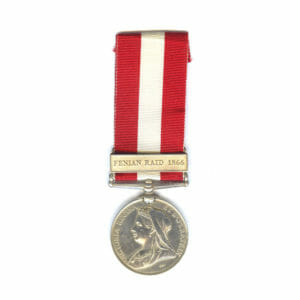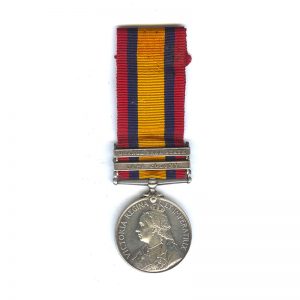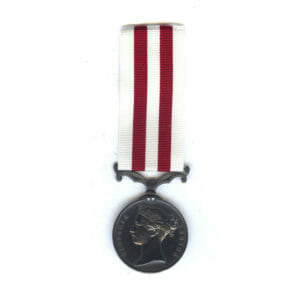Description
Ghuznee 1839, Sergeant Henry Bottle, 16th Queen’s Own Lancers.
Engraved in attractive flowing script: Serjeant Henry Bottle Her M’s 16th Lancers.
A most popular and gallant sergeant of the 16th Lancers, who joined them first at Cawnpore in 1835 and rose to Sergeant taking part in all the actions with the regiment through the Afghanistan War, Maharajpoor & Sutlej war, he died whilst serving having fallen violently ill, stationed with his regiment in Norfolk during 1848.
For his service he is additionally entitled to the Maharajpoor Star, which is out there in the market, sold by Sotheby’s on 25th September 2001, named in the same style noted as “Serjeant Henry Bottle, Her M. 16th Lancers”
He is also entitled to the Sutlej Medal, reverse for Aliwal with Bar Sobraon.
Kentish Gazette 18th April 1848:
“THE 16th LANCERS
Names of men, born in the county of Kent, belonging to the 16th Queen’s Own Lancers, with an account of their services under Lord Kean, Sir Hugh Gough, and at the Battle of Aliwal under Major General Sir Harry Smith C.B., on the 28th January 1846.
Sergeant Henry Bottle, born at Romney, served at Afghanistan and Ghuznee 23rd July 1839; campaign on the Sutlej and Lahore, 1846; Maharajpoor 29th December 1843.”
Norfolk Chronicle 5th August 1848:
“ANOTHER SOLDIERS FUNERAL –
On Thursday another of the heroes of Sobraon, Sergeant Henry Bottle, of the 16th Lancers, was buried, with the usual military honours, at the Rosary.
He had been in the Hospital about a month, in consequence of an illness which commenced with a cold; and the bursting of a blood vessel, during a violent fit of coughing, ended his life. The deceased had distinguished himself in various engagements in India, having joined the regiment in 1835, at Cawnpore, and remained in it till his death. He served throughout the campaign in Afghanistan; at the siege and capture of Ghuznee, in 1839; at Maharajpoor, in December 1843, and afterwards at Aliwal and Sobraon.
He received a medal for each service; and, we understand, he was much respected by his comrades, a considerable number of whom followed him to his grave. – He has left a wife and two children.”
Norfolk News 5th August 1848:
“MILITARY FUNERAL – The remains of Sergeant Bottle, of the 16th Lancers, now stationed at Norwich, were yesterday consigned to their last resting place, at the Rosary, Thorpe. This officer, we understand, distinguished himself in several engagements in India, and has been honoured by the presentation of a considerable number of medals, as tokens of the esteem which his valourous conduct had gained for him. The body was followed to the tomb by a large company of the gallant officer’s friends and fellow soldiers, by whom he was universally respected.”
The Book “Ten Years in India, in the Queen’s 16th Lancers” is an excellent book written by a fellow Sergeant in the 16th Lancers who served with Sergt Bottle in all the same engagements.
It can be read for free here to gain a better understanding of his role during the campaign; https://archive.org/details/tenyearsinindiai00gouluoft
Sergeant Gould speaks about their role storming ghuznee here;
“On the 4th June we broke up camp and started for Ghuznee, our way lying through the Bolan Pass.
As we approach its appearance is formidable, the mountains at each side seem to reach to the clouds, they have an ascent of 14,000 feet.
Arriving at Ghuznee on 21st July, we observed on the hills, Hadjie Khan the commander of Dost Mahomet’s army encamped with twenty thousand men.
Ghuznee is strongly fortified, cut out of solid rock, on the slopes of a hill, surrounded by a moat. As the enemy commended firing on the 22nd with a heavy shot, our commander thought better to move the camp back about two miles.
On the morning of the 23rd, we moved up at three o’clock, and got into position. One division of cavalry opposite the gate on the Cabul road; one part of our force moved off to our left, to watch the enemy on the hills, and make a feint attack on their position on the opposite side, so as to draw their attention from us.
We were occupied in placing batteries so as to command the gate; at the same time Colonel Thompson, of the Engineers, was laying a chain cable to throw a bridge across the Moat.
When this was accomplished a mine was laid under the stone buttresses, and at a quarter to six o’clock the mine was opening, and up went the gates with a terrific crash.
The storming party, consisting of the 13th Light Infantry, under Colonel Sale; the 2nd or Queen’s, under Sir Thomas Wiltshire; when the bugle sounded, commenced their attack under a heavy fire – the 13th had the honour of leading.
The enemy everywhere made a terrific resistance. Colonel Sale was knocked off his horse and trampled upon, still he ordered the Bugler to sound a retreat, instead of which, whether intentional or not, the advance was sounded.
Nothing could daunt the ardour and bravery of the men. They soon gained a footing inside, where hand to hand encounters was carried on in its most relentless form, and in half an hour, both regiments were firmly established inside the walls. By daylight the British Flag was mounted on the Citadel, many of the enemy having thrown themselves therefrom, rather than surrender, to the Moat below, a distance of 150 feet.
We were ordered to enter and seize the horses, which were running wildly without riders, which we did after some hard work, and brought them to the prize agent outside.
We were annoyed however, very much, through having to encounter the worst of firing, as many of he Afghans popped at us from loop-holes and windows in every street of the city.
When the sun rose on the hills the Infantry could plainly be seen ascending the greatest heights of the Citadel, far above the city; here they got into the bank, and loaded themselves with money. Many of the enemy were trying to escape to the valley away on our left; these, and the force on the mountains, kept our troops in that direction busy. By 2 o’clock pm, all was over and Ghuznee was in possession of the British.”
He then talks about the haunting effects of the battle on himself:
“When all opposition ceased, and one went through the city, now filled with sounds of wailing, he cannot but be struck with the dreadful havoc war brings with it. This was my first general action, and although when in the heat of it, I felt no pity for any one, at least I cannot remember feeling so, still, when the desolation is complete, and you are met everywhere with its sad effects, property destroyed, mutilation of brutes, horses, camels, & dead, and writhing in pain from wounds; wounded men and women everywhere begging for mercy or succour, the dead piled all round, the most hardened must give way to sadness. Shash Soojah, our newly crowned king, was busy on our right, hanging and shooting traitors, some of them leading Chiefs who had fallen into his hands. The whole of the 24th was occupied in burying the dead, and on the following day Hadjee Khan came in, and gave up his sword, a beautiful one, the hilt studded with costly gems; for its possessions the officers had race, which was won by the 4th Light Dragoons. The horses captured, all of them valuable Arab or Turcoman were sold by auction, the proceeds appropriated as prize money.”
